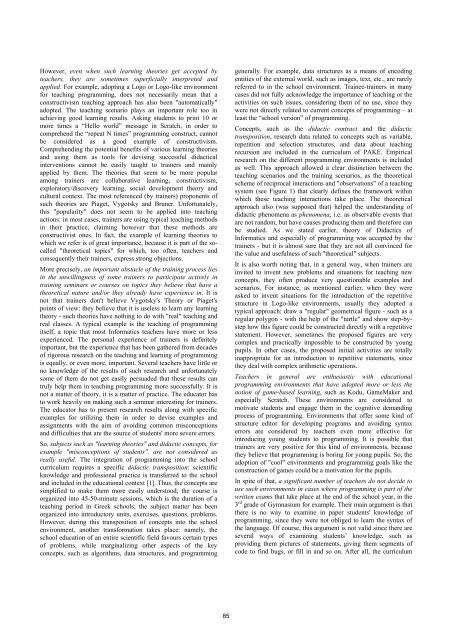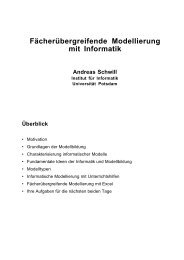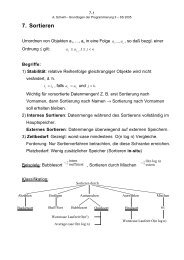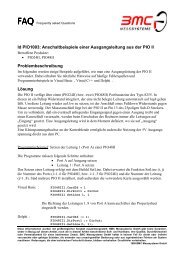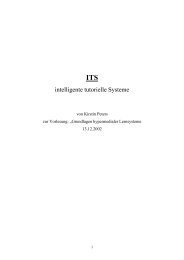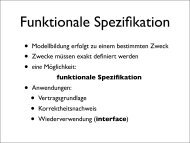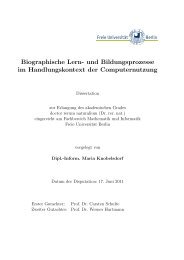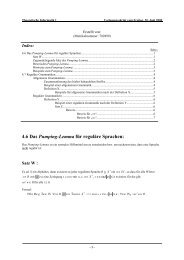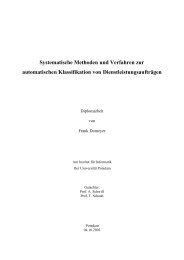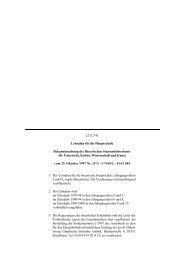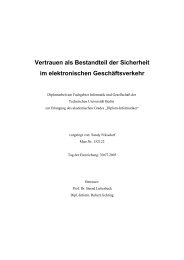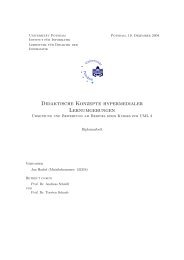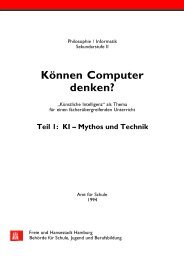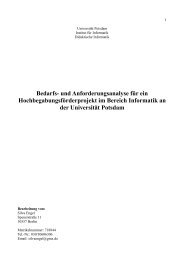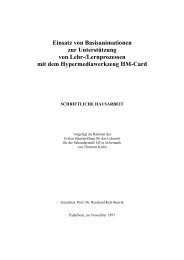Maria Knobelsdorf, University of Dortmund, Germany - Didaktik der ...
Maria Knobelsdorf, University of Dortmund, Germany - Didaktik der ...
Maria Knobelsdorf, University of Dortmund, Germany - Didaktik der ...
Create successful ePaper yourself
Turn your PDF publications into a flip-book with our unique Google optimized e-Paper software.
However, even when such learning theories get accepted by<br />
teachers, they are sometimes superficially interpreted and<br />
applied. For example, adopting a Logo or Logo-like environment<br />
for teaching programming, does not necessarily mean that a<br />
constructivism teaching approach has also been "automatically"<br />
adopted. The teaching scenario plays an important role too in<br />
achieving good learning results. Asking students to print 10 or<br />
more times a “Hello world” message in Scratch, in or<strong>der</strong> to<br />
comprehend the “repeat N times” programming construct, cannot<br />
be consi<strong>der</strong>ed as a good example <strong>of</strong> constructivism.<br />
Comprehending the potential benefits <strong>of</strong> various learning theories<br />
and using them as tools for devising successful didactical<br />
interventions cannot be easily taught to trainers and mainly<br />
applied by them. The theories that seem to be more popular<br />
among trainers are collaborative learning, constructivism,<br />
exploratory/discovery learning, social development theory and<br />
cultural context. The most referenced (by trainers) proponents <strong>of</strong><br />
such theories are Piaget, Vygotsky and Bruner. Unfortunately,<br />
this "popularity" does not seem to be applied into teaching<br />
actions: in most cases, trainers are using typical teaching methods<br />
in their practice, claiming however that these methods are<br />
constructivist ones. In fact, the example <strong>of</strong> learning theories to<br />
which we refer is <strong>of</strong> great importance, because it is part <strong>of</strong> the socalled<br />
"theoretical topics" for which, too <strong>of</strong>ten, teachers and<br />
consequently their trainers, express strong objections.<br />
More precisely, an important obstacle <strong>of</strong> the training process lies<br />
in the unwillingness <strong>of</strong> some trainers to participate actively in<br />
training seminars or courses on topics they believe that have a<br />
theoretical nature and/or they already have experience in. It is<br />
not that trainers don't believe Vygotsky's Theory or Piaget's<br />
points <strong>of</strong> view: they believe that it is useless to learn any learning<br />
theory - such theories have nothing to do with "real" teaching and<br />
real classes. A typical example is the teaching <strong>of</strong> programming<br />
itself, a topic that most Informatics teachers have more or less<br />
experienced. The personal experience <strong>of</strong> trainers is definitely<br />
important, but the experience that has been gathered from decades<br />
<strong>of</strong> rigorous research on the teaching and learning <strong>of</strong> programming<br />
is equally, or even more, important. Several teachers have little or<br />
no knowledge <strong>of</strong> the results <strong>of</strong> such research and unfortunately<br />
some <strong>of</strong> them do not get easily persuaded that these results can<br />
truly help them in teaching programming more successfully. It is<br />
not a matter <strong>of</strong> theory, it is a matter <strong>of</strong> practice. The educator has<br />
to work heavily on making such a seminar interesting for trainers.<br />
The educator has to present research results along with specific<br />
examples for utilizing them in or<strong>der</strong> to devise examples and<br />
assignments with the aim <strong>of</strong> avoiding common misconceptions<br />
and difficulties that are the source <strong>of</strong> students' more severe errors.<br />
So, subjects such as "learning theories" and didactic concepts, for<br />
example "misconceptions <strong>of</strong> students", are not consi<strong>der</strong>ed as<br />
really useful. The integration <strong>of</strong> programming into the school<br />
curriculum requires a specific didactic transposition: scientific<br />
knowledge and pr<strong>of</strong>essional practice is transferred to the school<br />
and included in the educational context [1]. Thus, the concepts are<br />
simplified to make them more easily un<strong>der</strong>stood; the course is<br />
organized into 45-50-minute sessions, which is the duration <strong>of</strong> a<br />
teaching period in Greek schools; the subject matter has been<br />
organized into introductory units, exercises, questions, problems.<br />
However, during this transposition <strong>of</strong> concepts into the school<br />
environment, another transformation takes place: namely, the<br />
school education <strong>of</strong> an entire scientific field favours certain types<br />
<strong>of</strong> problems, while marginalizing other aspects <strong>of</strong> the key<br />
concepts, such as algorithms, data structures, and programming<br />
85<br />
generally. For example, data structures as a means <strong>of</strong> encoding<br />
entities <strong>of</strong> the external world, such as images, text, etc., are rarely<br />
referred to in the school environment. Trainee-trainers in many<br />
cases did not fully acknowledge the importance <strong>of</strong> teaching or the<br />
activities on such issues, consi<strong>der</strong>ing them <strong>of</strong> no use, since they<br />
were not directly related to current concepts <strong>of</strong> programming – at<br />
least the “school version” <strong>of</strong> programming.<br />
Concepts, such as the didactic contract and the didactic<br />
transposition, research data related to concepts such as variable,<br />
repetition and selection structures, and data about teaching<br />
recursion are included in the curriculum <strong>of</strong> PAKE. Empirical<br />
research on the different programming environments is included<br />
as well. This approach allowed a clear distinction between the<br />
teaching scenarios and the training scenarios, as the theoretical<br />
scheme <strong>of</strong> reciprocal interactions and "observations" <strong>of</strong> a teaching<br />
system (see Figure 1) that clearly defines the framework within<br />
which these teaching interactions take place. The theoretical<br />
approach also (was supposed that) helped the un<strong>der</strong>standing <strong>of</strong><br />
didactic phenomena as phenomena, i.e. as observable events that<br />
are not random, but have causes producing them and therefore can<br />
be studied. As we stated earlier, theory <strong>of</strong> Didactics <strong>of</strong><br />
Informatics and especially <strong>of</strong> programming was accepted by the<br />
trainers - but it is almost sure that they are not all convinced for<br />
the value and usefulness <strong>of</strong> such "theoretical" subjects.<br />
It is also worth noting that, in a general way, when trainers are<br />
invited to invent new problems and situations for teaching new<br />
concepts, they <strong>of</strong>ten produce very questionable examples and<br />
scenarios. For instance, as mentioned earlier, when they were<br />
asked to invent situations for the introduction <strong>of</strong> the repetitive<br />
structure in Logo-like environments, usually they adopted a<br />
typical approach: draw a "regular" geometrical figure - such as a<br />
regular polygon - with the help <strong>of</strong> the "turtle" and show step-bystep<br />
how this figure could be constructed directly with a repetitive<br />
statement. However, sometimes the proposed figures are very<br />
complex and practically impossible to be constructed by young<br />
pupils. In other cases, the proposed initial activities are totally<br />
inappropriate for an introduction to repetitive statements, since<br />
they deal with complex arithmetic operations.<br />
Teachers in general are enthusiastic with educational<br />
programming environments that have adopted more or less the<br />
notion <strong>of</strong> game-based learning, such as Kodu, GameMaker and<br />
especially Scratch. These environments are consi<strong>der</strong>ed to<br />
motivate students and engage them in the cognitive demanding<br />
process <strong>of</strong> programming. Environments that <strong>of</strong>fer some kind <strong>of</strong><br />
structure editor for developing programs and avoiding syntax<br />
errors are consi<strong>der</strong>ed by teachers even more effective for<br />
introducing young students to programming. It is possible that<br />
trainers are very positive for this kind <strong>of</strong> environments, because<br />
they believe that programming is boring for young pupils. So, the<br />
adoption <strong>of</strong> "cool" environments and programming goals like the<br />
construction <strong>of</strong> games could be a motivation for the pupils.<br />
In spite <strong>of</strong> that, a significant number <strong>of</strong> teachers do not decide to<br />
use such environments in cases where programming is part <strong>of</strong> the<br />
written exams that take place at the end <strong>of</strong> the school year, in the<br />
3 rd grade <strong>of</strong> Gymnasium for example. Their main argument is that<br />
there is no way to examine in paper students' knowledge <strong>of</strong><br />
programming, since they were not obliged to learn the syntax <strong>of</strong><br />
the language. Of course, this argument is not valid since there are<br />
several ways <strong>of</strong> examining students’ knowledge, such as<br />
providing them pictures <strong>of</strong> statements, giving them segments <strong>of</strong><br />
code to find bugs, or fill in and so on. After all, the curriculum


